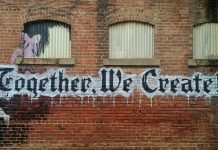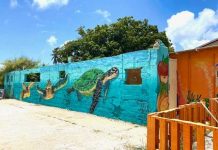Meet Our New Columnist
ORANJESTAD — Thaïs G. Franken is a Master Student at the University of Maastricht in The Netherlands and Graduate School of Governance | UNI-MERIT. Aruba Today met this remarkable young lady during an interview for our newspaper. Her ambitions, her drive, her passion and her happy forthcoming made a big impression and out of this came the mutual desire to work together. Aruba Today is more than happy to announce Thaïs as our new columnist. Her column Creative Islander will appear every two weeks on Thursday in Aruba. Welcome to the club Thaïs.
 Biography – Currently, Thaïs Franken is a 22-year-old Aruban student at the University of Maastricht (UM). She is studying a Master of Science in Public Policy and Human Development in collaboration with the Unites Nations University (UNU). Back home, on the beautiful island of Aruba she completed her Bachelor of Arts in Organization, Governance & Management (OGM) at the University of Aruba (UA). She successfully graduated and defended her thesis titled “Placing Culture and Creativity at the Heart of the Aruban Sustainable Development” on July 6th 2018. Thaïs is very passionate about topics such as sustainability, innovation, culture and creativity. Next to her academic interests, she enjoys reading, writing, dancing and cooking.
Biography – Currently, Thaïs Franken is a 22-year-old Aruban student at the University of Maastricht (UM). She is studying a Master of Science in Public Policy and Human Development in collaboration with the Unites Nations University (UNU). Back home, on the beautiful island of Aruba she completed her Bachelor of Arts in Organization, Governance & Management (OGM) at the University of Aruba (UA). She successfully graduated and defended her thesis titled “Placing Culture and Creativity at the Heart of the Aruban Sustainable Development” on July 6th 2018. Thaïs is very passionate about topics such as sustainability, innovation, culture and creativity. Next to her academic interests, she enjoys reading, writing, dancing and cooking.
Cultural & Creative Industries, a bit of the old and new
Culture for many people is the summary of their being. For others, it might be a form of expression or simply a framework for belonging. No matter the depth or the width, culture seems to speak its own language. Now, how does this evolve as time goes by? Does culture mean the same for all groups of people? Is culture important within a society? Should creativity be encouraged? Can this contribute to a country’s economic development?
Aruba for years has been an island focused on generating economic growth in sectors such as the tourism industry and the oil industry. Seeing the current times, it has become clear that other industries should be explored and considered. With the need for economic diversification in Aruba, in 2016 the government has indicated the Cultural and Creative Industry (CCI) as a potential industry within Aruba’s vision of developing a knowledge economy. CCI refers to sectors of organized activity whose principal purpose is the production or reproduction, promotion, distribution and/or commercialization of goods, services and activities of a cultural, creative, artistic or heritage-related nature. 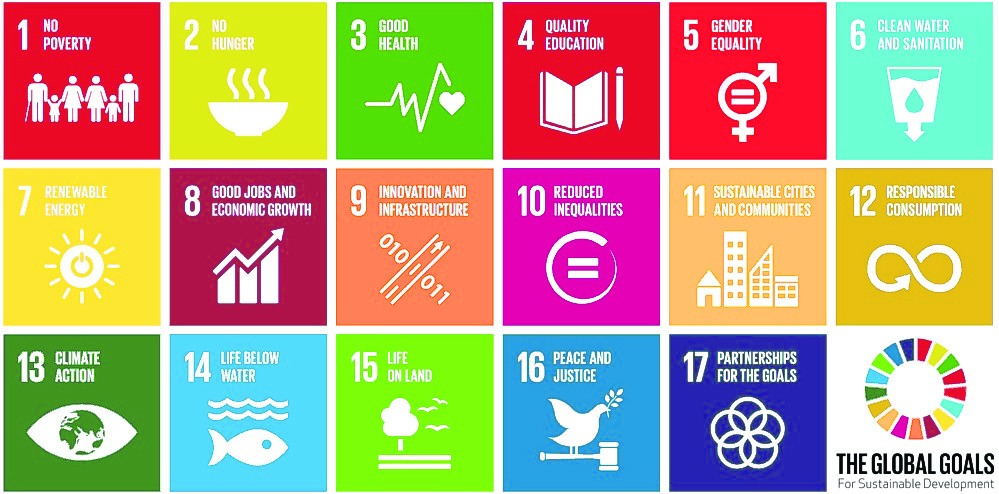
Considering the Sustainable Development Goals (SDGs) of the United Nations, Aruba as part of the Dutch Kingdom signed a treaty to be committed to the development of these goals. These goals consist of 17 goals covering development areas such as poverty, healthcare, quality of education, gender equality, clean water and sanitation, clean energy, economic growth, innovation and infrastructure, reduced inequalities, sustainable cities, responsible consumption, climate action, life below water, life on land, peace and strong institutions and partnerships.
The Cultural and Creative Industries is an inclusive look towards preserving heritage and innovating for the future. Aruba is rich in culture, history, tangible heritage, intangible heritage and creativity. From the old traditions that run through traditional folk music, dance, architecture, culinary, craft and literacy. Aruba knows tremendous cultural expression such as the carnival, where creativity is put on blast. As new generations are being raised, from the old traditions, new variants are formed.
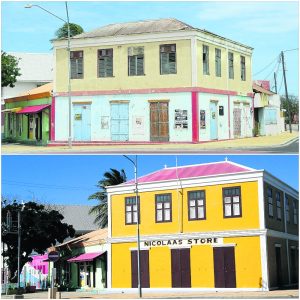
In these illustrations, we can see distinct differences related to tradition and innovation. The Nicolas Store, built in 1940 is a tangible heritage site of Aruba that is now owned by the Monuments Fund of Aruba. This building now restored functions as the community museum in San Nicolas. This building consisted only of the ground floor and served as a store where they sold books, instruments, newspapers, gifts and many more. Later the first floor was constructed and became the house where the owner lived with its family.
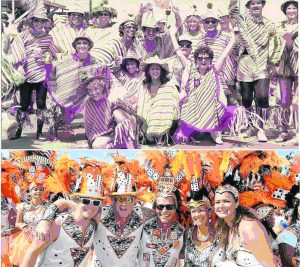 Another Example is the beautiful evolvement of carnival on the island. In the illustrations, it is clear that there has been drastic changes from then to now. This evolvement is due to many things, but the most relevant is the development of creativity and the use of cultural fusion. From the costumes, the music, the road pieces, the headpieces, the designs, the dancing, the singing, the performing, the festivals, Aruba displays all things culture and creativity.
Another Example is the beautiful evolvement of carnival on the island. In the illustrations, it is clear that there has been drastic changes from then to now. This evolvement is due to many things, but the most relevant is the development of creativity and the use of cultural fusion. From the costumes, the music, the road pieces, the headpieces, the designs, the dancing, the singing, the performing, the festivals, Aruba displays all things culture and creativity.
So please join me in this journey of uncovering Aruba’s CCI. Through the Creative Islander we will explore how the cultural and creative industries could potentially impact the economic, cultural and social development of the island. The place where creativity and culture meets and coexists. Besides focusing on the Aruban context, we will explore how other countries are developing within this industry and how it has impacted the development of their country. Stay up to date with the Creative Islander, the moment for all thing culture and creativity. q








